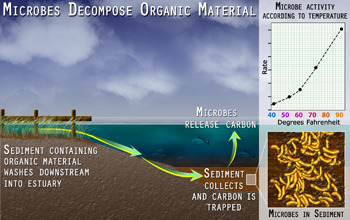News Release 05-198
Microbes in Marine Sediments React to Temperature Changes
Discovery alters view of coastal organic matter recycling
November 14, 2005
This material is available primarily for archival purposes. Telephone numbers or other contact information may be out of date; please see current contact information at media contacts.
Marine scientists from the University of Georgia have shown for the first time that temperature affects the biological activity of microbes that degrade organic carbon in marine sediments. Warming global temperatures could therefore cause shifts in the balance of organic carbon that is recycled into the atmosphere or buried in sediments that serve as reservoirs for the substance.
Relatively little has been known until now about how temperature affects this microbial process, which is responsible for the initial breakdown of complex organic matter in sediments, said oceanographer Samantha Joye of the University of Georgia and lead scientist on the study. "What we report was completely unexpected. Temperature short-circuits organic matter recycling," she said.
Joye and coworker, Nathaniel Weston, are publishing their results the week of Nov.14 in the Proceedings of the National Academy of Sciences.
"These surprising results show that temperature strongly affects organic matter breakdown and needs to be taken into account in understanding the role of sediments in the global carbon cycle," said Paul Kemp, program director in the National Science Foundation (NSF)'s Biological Oceanography Program, which supported the research along with NSF's Long-Term Ecological Research (LTER) Program.
The research was conducted at the Georgia Coastal Ecosystems LTER site located on the central Ga. coast and encompassing the estuaries, sounds and marshes surrounding Sapelo Island, Ga. There a buffer of barrier islands protect vast expanses of tidal salt marshes.
Scientists have long known that buried organic carbon in marine sediments plays a crucial role in many terrestrial and atmospheric processes. The number of microorganisms that feast upon this carbon is vast.
"The microbes responsible for organic matter degradation in sediments are often ignored," said Weston. "We were interested in opening the microbial 'black box' in sediments and clarifying the temperature controls on different microbial groups."
Weston and Joye studied sediment cores from Umbrella Creek near the mouth of the Satilla River on the Ga. coast. By sampling sediments at different times of the year, they found that temperature affected the processes that led to the breakdown of organic carbon. Microbes at work in sediments have different optimal temperature ranges, and thus operate at different rates, depending on temperature.
"Microbial processes involved in organic carbon breakdown are extremely sensitive to even small changes in temperature," said Joye. "These results suggest that global climate change may influence the efficiency of organic carbon recycling," impacting coastal ecosystems.
It's as yet unknown, said Joye, whether the temperature-driven changes documented for marine sediments in Ga., located in a temperate climate region, will apply to other geographic zones, such as tropical environments.
The research was also supported by the Georgia Sea Grant Program.
-NSF-
Media Contacts
Cheryl Dybas, NSF, (703) 292-7734, email: cdybas@nsf.gov
The U.S. National Science Foundation propels the nation forward by advancing fundamental research in all fields of science and engineering. NSF supports research and people by providing facilities, instruments and funding to support their ingenuity and sustain the U.S. as a global leader in research and innovation. With a fiscal year 2023 budget of $9.5 billion, NSF funds reach all 50 states through grants to nearly 2,000 colleges, universities and institutions. Each year, NSF receives more than 40,000 competitive proposals and makes about 11,000 new awards. Those awards include support for cooperative research with industry, Arctic and Antarctic research and operations, and U.S. participation in international scientific efforts.
Connect with us online
NSF website: nsf.gov
NSF News: nsf.gov/news
For News Media: nsf.gov/news/newsroom
Statistics: nsf.gov/statistics/
Awards database: nsf.gov/awardsearch/
Follow us on social
Twitter: twitter.com/NSF
Facebook: facebook.com/US.NSF
Instagram: instagram.com/nsfgov



